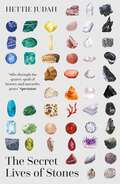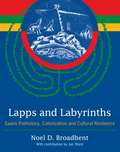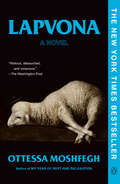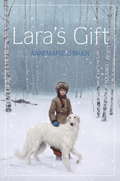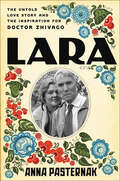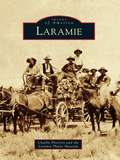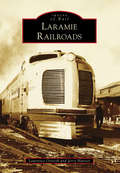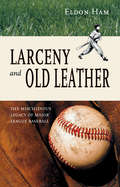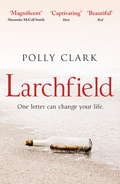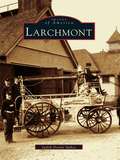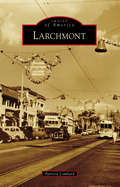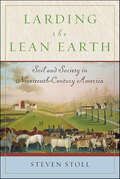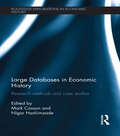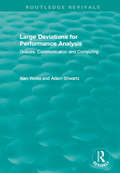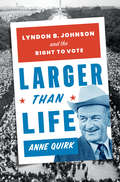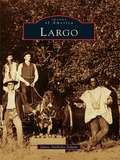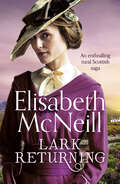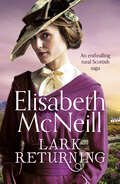- Table View
- List View
Lapidarium: The Secret Lives of Stones
by Hettie Judah'A delightful storybook . . . a portrait of our whole world created from the contents of the ground' Literary Review'A real cabinet of curiosities' Sunday TimesFrom the hematite used in cave paintings to the moldavite that became a TikTok sensation; from the stolen sandstone of Scone to the unexpected acoustics of Stonehenge; from crystal balls to compasses, rocks and minerals have always been central to our story.3,000 years ago Babylonians constructed lapidaries - books that tried to pin down the magical secrets of rocks. In The Secret Lives of Stones, renowned art critic Hettie Judah explores the unexpected stories behind sixty stones that have shaped and inspired human history, from Dorset fossil-hunters to Chinese philosophers, Catherine the Great to Michelangelo.Discover why alchemists sought cinnabar and sulphur. Unearth the mystery of the tuff statues of Rapa Nui, the lost amber room of Frederick of Prussia and the scandal of Flint Jack. Find out how a Greek monster created coral, moon rock explains the history of Earth's only satellite and obsidian inspired the world's favourite computer game. Stone by stone, story by fascinating story, The Secret Lives of Stones builds into a dazzling, epoch-spanning adventure through human culture, and beyond.
Lapps and Labyrinths: Saami Prehistory, Colonization, and Cultural Resilience
by Noel D. Broadbent Jan StoraProfessor Noel D. Broadbent is one of Sweden's foremost experts on north Swedish archaeology and literally wrote the book on the prehistory of the Skellefteå region on the North Bothnian coast. This knowledge is now brought to bear on the issue of Saami origins. The focus is on the successful adaptive strategies of Saami societies over thousands of years - a testimony to Saami resiliency, of relevance to the survival of indigenous societies worldwide today.
Lapvona: A Novel
by Ottessa MoshfeghAn Instant New York Times Bestseller!&“Lapvona flips all the conventions of familial and parental relations, putting hatred where love should be or a negotiation where grief should be . . . Through a mix of witchery, deception, murder, abuse, grand delusion, ludicrous conversations, and cringeworthy moments of bodily disgust, Moshfegh creates a world that you definitely don&’t want to live in, but from which you can&’t look away.&” —The AtlanticIn a village buffeted by natural disasters, a motherless shepherd boy finds himself part of a power struggle that puts the community&’s faith to a savage test, in a spellbinding novel that represents Ottessa Moshfegh&’s most exciting leap yetLittle Marek, the abused and delusional son of the village shepherd, believes his mother died giving birth to him. One of Marek&’s few consolations is his enduring bond with the blind village midwife, Ina, who suckled him when he was a baby. For some people, Ina&’s ability to receive transmissions of sacred knowledge from the natural world is a godsend. For others, Ina&’s home in the woods is a godless place.The people&’s desperate need to believe that there are powers that be who have their best interests at heart is put to a cruel test by their depraved lord and governor, especially in this year of record drought and famine. But when fate brings Marek into violent proximity to the lord&’s family, new and occult forces arise to upset the old order. By year&’s end, the veil between blindness and sight, life and death, and the natural world and the spirit world will prove to be very thin indeed.
Lara (World of Hetar #1)
by Bertrice SmallNew York Times and USA TODAY bestselling author and master of romance Bertrice Small welcomes you to the magical, sensual World of Hetar. For Lara, a half faerie, half human, her beauty is a blessing and a curse. Sold into a Pleasure House by her father, she commits herself to a lifetime of servitude. But even in a place where pleasure is not censured but encouraged, her otherworldly beauty proves too much for her suitors.When Lara escapes, she is introduced to a new way of life, and an incredible man who opens her eyes to the growing unrest among their people... and the extraordinary destiny that awaits her. Lara will journey the depths of desire and despair to find a love that will last an eternity-a love that will change Hetar forever.
Lara's Gift
by Annemarie O'BrienYoung Lara is being groomed in the family tradition to take over as Count Voronstov's next kennel steward, breeding borzoi dogs worthy of the Tsar. But then Lara's baby brother is born and she finds herself supplanted as her father decides to make her brother the next kennel steward. Going against her father's wishes and becoming increasingly sure of her special gift of understanding these incredible dogs, Lara risks everything when she reveals the truth about her visions. Now she must save Zar, her favorite borzoi and the one she raised from birth, from a hungry pack of wolves. Only then can she find her own, extraordinary destiny. . . .
Lara: The Untold Love Story and the Inspiration for Doctor Zhivago
by Anna PasternakLara is the heartbreaking story of lovers Boris Pasternak, the author of Doctor Zhivago, and Olga Ivinskaya—the true tragedy behind the timeless classic.“Anna Pasternak does not spare an ounce of drama nor detail from the story of her great-uncle’s love affair with Olga Ivinskaya, the inspiration for Doctor Zhivago’s Lara. The result is a profoundly moving meditation on love, loyalty and, ultimately, forgiveness.” —New York Times–bestselling author Amanda ForemanWhen Stalin came into power in 1924, the Communist government began persecuting dissident writers. Though he spared the life of Boris Pasternak—whose novel-in-progress, Doctor Zhivago, was suspected of being anti-Soviet—Stalin persecuted Boris’s mistress, typist, and literary muse, Olga Ivinskaya. Boris’s affair devastated the Pasternaks, and they were keen to disavow Olga’s role in Boris’s writing. Twice sentenced to work in Siberian labor camps, Olga was interrogated about Boris’s book, but she didn’t betray the man she loved. Released from the gulags, Olga assumed that Boris would leave his wife for her but, trapped by his family’s expectations and his own weak will, he never did. Drawing on previously neglected family sources and original interviews, Anna Pasternak explores her great-uncle’s hidden act of moral compromise, and restores to history the passionate affair that inspired and animated Doctor Zhivago. Devastated that Olga suffered on his behalf and frustrated that he could not match her loyalty to him, Boris instead channeled his thwarted passion for her into his novel’s love story. Filled with the rich detail of Boris’s secret life, Lara unearths a moving love story of courage, loyalty, suffering, drama, and loss, casting a new light on the legacy of Doctor Zhivago.
Laramie
by Laramie Plains Museum Charlie PetersenWhile it was still part of Dakota Territory, the town of Laramie was founded in 1868 with the arrival of the Union Pacific Railroad. Laramie's placement on the high plains at an elevation of 7,200 feet hasnot made for an easy existence, but the hardy ranching families and cowboys, with their cattle hunkered down against the winds and snow, survived in spite of their harsh surroundings and even thrived in this unique eastern Wyoming town. This is the place where the infamous Jack McCall hid from the authorities, where Teddy Roosevelt rode the range, and where Butch Cassidy was held at the Wyoming Territorial Prison. From its early, rowdy days as an end-of-the-tracks tent town on the railroad, with gambling halls and an active nightlife, through the growing-up years of mills, quarries, and local wartime heroes, to the establishment of Wyoming's only state university, Laramie's remarkable story is told here through historic photographs.
Laramie Railroads
by Jerry Hansen Lawrence OstreshOn July 1, 1862, President Lincoln signed the Pacific Railway Act. This act created the Union Pacific Railroad and authorized government loans and land grants to aid in the construction of the nation's first transcontinental railroad, which would connect Omaha, Nebraska, to Sacramento, California. As the Union Pacific raced west across prairies, mountains, and basins in 1867 and 1868, the Territory of Wyoming and many of its southern towns and cities were founded, including Laramie. In 1869, the Union Pacific met the Central Pacific at Promontory Summit, Utah, and the transcontinental railroad was complete. This is the story of the railroads of Laramie, a fabled place along the Union Pacific's Overland Route.
Larceny and Old Leather: The Mischievous Legacy of Major League
by Eldon L. HamEvery baseball player from little league to the big leagues knows it is illegal to steal signs, yet every major league team assigns someone to do just that. Baseball thrives on trickery and deception. But as our oldest major team sport, its larcenous legacy goes much deeper than the field of play. In LARCENY AND OLD LEATHER: THE MISCHIEVOUS LEGACY OF MAJOR LEAGUE BASEBALL, Eldon Ham—sports lawyer, professor, and author—traces the game's lesser-known, roguish past. His wry chapters, filled with anecdotes and statistics, expose both the hidden and the obvious cheating occurring throughout baseball's history, from corked bats and spitballs to betting and media hyperbole. Here is a book for both seasoned baseball fans and neophytes who'd like to get a look at the game that evolved into an industry. Babe Ruth, Sammy Sosa, Pete Rose, and many other lesser known players make their appearance in this fascinating history, as Ham seeks not only to chronicle the legacy of deception inherent within the game, but also to explore why it is, and how it is, that this deception is exactly what makes baseball the most endearing of American games.
Larchfield: The moving, gripping and wonderful debut about finding human connection
by Polly Clark'Gripping' Margaret Atwood 'Captivating' Louis de Bernières 'Magnificent' Alexander McCall SmithIn 1930, a young man, torn apart by his illegal desire, stands on a deserted Scottish beach. Wystan H. Auden is only twenty-four and longing to be a great poet; longing too, for someone who understands him. He scribbles his telephone number on a piece of paper, puts it in an empty milk bottle, and flings it into the sea.Decades later, Dora Fielding stands on the same beach, lost and desperate. Struggling to cope alone with her baby and suffocating in the small town, she yearns for connection. This is when she finds the message in the bottle. And calls the number.What happens next is a breathtaking leap of faith that rejoices in the power of the human imagination.
Larchmont
by Judith Doolin SpikesLarchmont has always been distinguished from other settlements north of New York City by its thirteen acres of public-access shoreline and glaciated coast on Long Island Sound. Settled in the early 1800s, it became a resort community after wealthy New Yorkers began buying up abandoned farmland to create country estates. It rose to international fame on the coattails of the Larchmont Yacht Club.
Larchmont
by Patricia LombardLarchmont Boulevard is more than a street; it is the soul and spine of the surrounding neighborhoods created in the early 1900s when Los Angeles was just coming into its own. Located in the heart of Los Angeles, Larchmont Boulevard is a charming, walkable street running north and south from Third Street to Melrose Avenue that gives residents and visitors the feeling of a small town tucked inside the vast, car-centric city of Los Angeles. This book tells the story of Larchmont's beginnings in 1921 when the Los Angeles Times reported that developers Julius La Bonte and Charles Ramson had purchased seven lots on Larchmont Boulevard to create a business district of 30 stores between First Street and Beverly Boulevard. The one-block stretch, where a trolley line once ran, is affectionately known as "the village" by locals in the surrounding neighborhoods of Brookside, Citrus Square, Country Club Heights, Fremont Place, Hancock Park, La Brea-Hancock, Larchmont Village, Melrose, Oakwood-Maplewood-St. Andrews, Ridgewood-Wilton/St. Andrews Square, Sycamore Square, Western-Wilton, Wilshire Park, Windsor Square, and Windsor Village.
Larding the Lean Earth: Soil and Society in Nineteenth-Century America
by Steven StollA major history of early Americans' ideas about conservationFifty years after the American Revolution, the yeoman farmers who made up a large part of the new country's voters faced a crisis. The very soil of American farms seemed to be failing, and agricultural prosperity, upon which the Republic was founded, was threatened. Steven Stoll's passionate and brilliantly argued book explores the tempestuous debates that erupted between "improvers," who believed in practices that sustained and bettered the soil of existing farms, and "emigrants," who thought it was wiser and more "American" to move westward as the soil gave out. Stoll examines the dozens of journals, from New York to Virginia, that gave voice to the improvers' cause. He also focuses especially on two groups of farmers, in Pennsylvania and South Carolina. He analyzes the similarities and differences in their farming habits in order to illustrate larger regional concerns about the "new husbandry" in free and slave states.Farming has always been the human activity that most disrupts nature, for good or ill. The decisions these early Americans made about how to farm not only expressed their political and social faith, but also influenced American attitudes about the environment for decades to come. Larding the Lean Earth is a signal work of environmental history and an original contribution to the study of antebellum America.
Large Countries’ Development Path: Experience and Theory
by Yao OuyangThis book aims to propose a unique analytical framework to find out the general successful experience for large developing countries, which are defined with two main physical characters of large population and vast land. They are naturally crucial for the global development. Thirteen countries are chosen as large developing countries in this book, which are China, India, Russia, Brazil, Mexico, Indonesia, South Africa, Iran, Egypt, Pakistan, Nigeria, Ethiopia and Congo (DRC). On the basis of selecting massive data, the author analyzes the performance of large countries in terms of human resources, natural resources, market size and other factors. The book conducts the comparative study of large countries’ latecomer strength, transformation path and innovation strategy with the perspective of development economics. It presents a comprehensive overview about large developing countries
Large Databases in Economic History: Research Methods and Case Studies (Routledge Explorations in Economic History #67)
by Mark Casson Nigar Hashimzade‘Big data’ is now readily available to economic historians, thanks to the digitisation of primary sources, collaborative research linking different data sets, and the publication of databases on the internet. Key economic indicators, such as the consumer price index, can be tracked over long periods, and qualitative information, such as land use, can be converted to a quantitative form. In order to fully exploit these innovations it is necessary to use sophisticated statistical techniques to reveal the patterns hidden in datasets, and this book shows how this can be done. A distinguished group of economic historians have teamed up with younger researchers to pilot the application of new techniques to ‘big data’. Topics addressed in this volume include prices and the standard of living, money supply, credit markets, land values and land use, transport, technological innovation, and business networks. The research spans the medieval, early modern and modern periods. Research methods include simultaneous equation systems, stochastic trends and discrete choice modelling. This book is essential reading for doctoral and post-doctoral researchers in business, economic and social history. The case studies will also appeal to historical geographers and applied econometricians.
Large Deviations For Performance Analysis: Queues, Communication and Computing (Routledge Revivals)
by Alan Weiss Adam ShwartzOriginally published in 1995, Large Deviations for Performance Analysis consists of two synergistic parts. The first half develops the theory of large deviations from the beginning, through recent results on the theory for processes with boundaries, keeping to a very narrow path: continuous-time, discrete-state processes. By developing only what is needed for the applications, the theory is kept to a manageable level, both in terms of length and in terms of difficulty. Within its scope, the treatment is detailed, comprehensive and self-contained. As the book shows, there are sufficiently many interesting applications of jump Markov processes to warrant a special treatment. The second half is a collection of applications developed at Bell Laboratories. The applications cover large areas of the theory of communication networks: circuit switched transmission, packet transmission, multiple access channels, and the M/M/1 queue. Aspects of parallel computation are covered as well including, basics of job allocation, rollback-based parallel simulation, assorted priority queueing models that might be used in performance models of various computer architectures, and asymptotic coupling of processors. These applications are thoroughly analysed using the tools developed in the first half of the book.
Larger Than Life: A History of Boy Bands from NKOTB to BTS
by Maria Shermanp.p1 {margin: 0.0px 0.0px 0.0px 0.0px; font: 14.0px Calibri} p.p2 {margin: 0.0px 0.0px 0.0px 0.0px; font: 14.0px Calibri; min-height: 17.0px} This nostalgic, fully-illustrated history of boy bands -- written by culture critic and boy band stan Maria Sherman -- is a must-have for diehard fans of the genre and beyond.The music, the fans, the choreography, the clothes, the merch, the hair. Long after Beatlemania came and went, a new unstoppable boy band era emerged. Fueled by good looks and even greater hooks, the pop phenomenon that dominated the '80s, '90s, and 2000s has left a long-lasting mark on culture, and it's time we celebrate it. Written by super fan Maria Sherman for stans and curious parties alike, Larger Than Life is the definitive guide to boy bands, delivered with a mix of serious obsession and tongue-in-cheek humor.Larger Than Life begins with a brief history of male vocal groups, spotlighting The Beatles, the Jackson 5, and Menudo before diving into the building blocks of these beloved acts in "Boy Bands 101." She also focuses on artists like New Edition, New Kids on the Block, Backstreet Boys, *NSYNC, One Direction, and BTS before ending with an interrogation into the future of boy bands. Included throughout are Tiger Beat-inspired illustrations, capsule histories of the swoon-iest groups, in-depth investigations into one-hit wonders, and sidebars dedicated to conspiracy theories, dating, in-fighting, haters, fan fiction, fashion (Justin and Britney in denim, of course), and so much more.Informative, affectionate, funny, and never, ever fan-shaming, Larger Than Life is the first and only text of its kind: the ultimate celebration of boy bands and proof that this once maligned music can never go unappreciated.
Larger than Life: President Lyndon B. Johnson And The Passing Of The Voting Rights Act
by Anne QuirkAn accessible, informed, and timely biography of Lyndon Johnson that centers his life and presidency around the passage of the Voting Rights Act. Keenly known for both his triumphs and his failures, Lyndon B. Johnson was one of the most complex and compelling presidents in US history. Anne Quirk’s biography alternates between chapters that follow LBJ’s childhood in rural Texas learning politics from his parents, his time teaching Mexican American students at a small-town school, and his days in Congress as majority leader and as vice president; and chapters that cover his work alongside civil rights leaders and the passage of the Voting Rights Act. An epilogue discusses the Supreme Court’s 2013 ruling that struck down key portions of the act. With engaging storytelling, Quirk paints a rich portrait of Johnson’s presidency, celebrating the accomplishments of his Great Society programs while refusing to shy away from his catastrophic decisions regarding Vietnam and the summer riots of 1967. Larger Than Life presents striking parallels to today’s political arena: an outsize character presiding over a divided nation—but to different ends.
Largo
by James Anthony SchnurPioneer settlers came to the west-central Pinellas peninsula in the years before the Civil War. The arrival of the railroad in 1888 brought truck farmers and expansive citrus groves. Decades before the city's incorporation in 1905, Largo became an important area for raising livestock, harvesting crops and timber, and trading citrus. Largo's farmers fed nearby urban communities during the Florida land boom while also providing winter fruits and vegetables to distant markets. Packing houses dotted the rural landscape during the years prior to World War II. By the 1960s, Largo expanded eastward toward Tampa Bay as new subdivisions sprouted in former groves. Known at various times as Citrus City, Fair City, Clean Air Capital, and City of Progress, Largo has grown from its roots as a small farming settlement to become the central crossroads and the third largest city in Florida's most densely populated county.
Larissa's Breadbook: Ten Incredible Southern Women and Their Stories of Courage, Adventure, and Discovery
by Lorraine Johnson-ColemanDo you ever wonder what makes the South one of the most incredible places on Earth? As Larissa discovers, it's the awe-inspiring women. In this engaging story, ten remarkable women from rich and varied cultures share their words, their wit, their wisdom, and their lives.The language of these women "is colorful and nuanced and often poetic, and the folks whose lives the storyteller enters and exits are complicated and comic, and at the same time often tragic. This community, woven together by the storyteller's enchantments...is moving and memorable." Lois Parkinson Zamora, professor at University of Houston, made those comments about the stories in Just Plain Folks, Lorraine Johnson-Coleman's earlier work. But they could just as easily have been written about the characters in Larissa's BreadBook.
Lark (Family Tree #4)
by Sally WatsonSet in seventeenth-century England under Cromwell, Sally Watson's LARK combines historical intrigue with romantic adventure in the high-spirited tale of a young girl who escapes from her uncle's stolid Puritan family. The daughter of Royalists exiled to France, thirteen-year-old Lark finds the prospect of marrying her cousin Will-of-God so distasteful that she decides to flee to the home of her sister in Scotland. On the way, she meets young James Trelawney, a Royalist spy whose annoyance with her slowly turns into concern and companionship as the two experience many harrowing, and occasionally humourous adventures. An unexpected encounter with Will-of-God, and a battle in which James is seriously wounded, finally lead the pair to refuge with a band of colourful Gypsies.
Lark Ascending
by Mazo de la RocheFrom the author of the bestselling Jalna series. This is essentially a novel of contrast — a story of light and shade, a contrast of Sicilian exuberance with the restraints of life in a Massachusetts fishing village. It finds beloved author Mazo de la Roche in a new vein. Here is a narrative lighter in quality than those which have to do with the turbulent Jalna scene, but no less sure in its characterization; no less picturesque in its detail.
Lark Returning
by Elisabeth McNeillGenerations of Scottish women bonded to farm work fall short of their dreams, but one might break away to follow her heart in this historical saga. Lark is a much-loved forces sweetheart spreading comfort as she sings in the music halls while Scotland&’s sons fight in the Great War. But despite her fortune, Lark yearns for a life away from the crowds. She sets out to make a fresh start in the Border country seeking the contentment that has eluded her. Decades earlier, Lark&’s great-grandmother, Jane, found herself in the same hills, in unhappy circumstances. Yet the beauty of the land brought peace to her when all hope seemed lost. A poignant and atmospheric multigenerational saga for fans of Val Wood and Tessa Barlcay.
Lark Returning: An enthralling rural Scottish saga
by Elisabeth McNeillCan Lark take the path of the woman who went before her and learn to follow her heart?Lark is a much-loved forces sweetheart spreading comfort as she sings in the music halls while Scotland’s sons fight in the Great War. But despite her fortune, Lark yearns for a life away from the crowds. She sets out to make a fresh start in the Border country seeking the contentment that has eluded her.Decades earlier, Lark’s great-grandmother, Jane, found herself in the same hills, in unhappy circumstances. Yet the beauty of the land brought peace to her when all hope seemed lost.A poignant and atmospheric multigenerational saga for fans of Val Wood and Tessa Barlcay.
Larkhill’s Wartime Locators: Royal Artillery Survey in the Second World War
by Massimo Mangilli-Climpson"Artillery survey suffered during the pacifist inter-war period but the war in North Africa highlighted its importance. By the end of 1942 ten major survey units had been formed. Nine were conventional serving in all the main theatres, including the Far East. They played a key part in victories such as El Alamein, Anzio, Caen and Imphal, with their flash-spotting, sound-ranging and surveying of gun lines. A tenth regiment was secretly involved tracing the flight of Hitlers V1 and V2 rockets in order to locate their launch bases.These soldier-scientists were all trained at the School of Survey, Larkhill, on Salisbury Plain. Their work took them to the front line and a considerable number were casualties or became POWs.This is the story of the contribution of these 4,000 men who made up the Survey Regiments. It tells of the heroes, such as Robert (Tug) Wilson of the SBS and the skilful men whose actions under the most difficult and dangerous conditions have received little acknowledgement until now."
